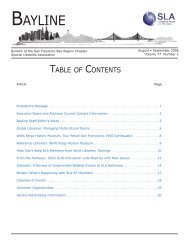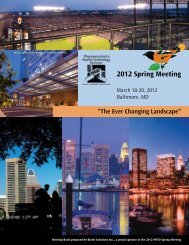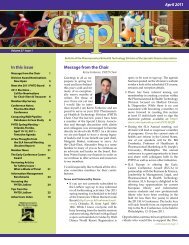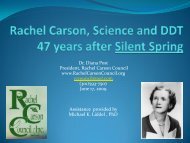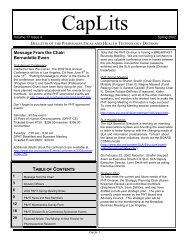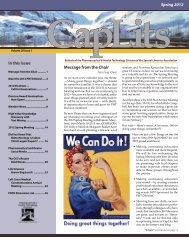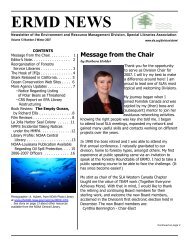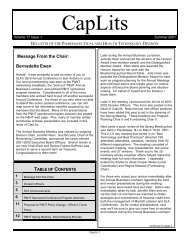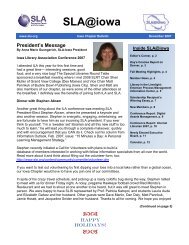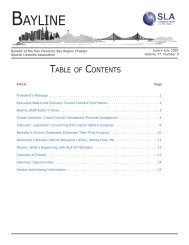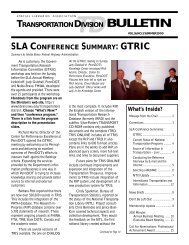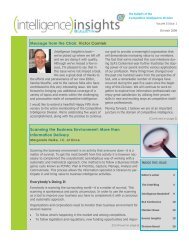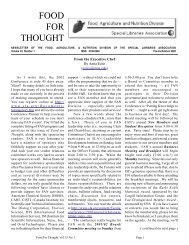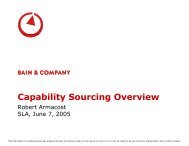Education Libraries - Special Libraries Association
Education Libraries - Special Libraries Association
Education Libraries - Special Libraries Association
Create successful ePaper yourself
Turn your PDF publications into a flip-book with our unique Google optimized e-Paper software.
The Archive-It harvesting service uses Heretix, an<br />
Open Source web crawler to harvest sites from the<br />
surface Internet.<br />
Data-PASS. (n.d.). Retrieved September 30, 2008,<br />
from the Inter-University Consortium for<br />
Political and Social Research website:<br />
http://www.icpsr.umich.edu/DATAPASS/<br />
The Data Preservation Alliance for the Social<br />
Sciences (Data-PASS) is “a broad-based partnership<br />
devoted to identifying, acquiring and preserving<br />
data at-risk of being lost to the social science<br />
research community.” It was established to preserve<br />
major social science research studies whose<br />
collections of data were at risk of being lost. The<br />
site includes a searchable catalog and many publicly<br />
accessible studies are downloadable.<br />
LOCKSS. (2008). Retrieved September 15, 2008,<br />
from http://lockss.org/lockss/Home<br />
LOCKSS is a distributed e-journal archiving<br />
program that was developed at Stanford University<br />
in 1998. A number of major universities in North<br />
America and Europe are now part of the LOCKSS<br />
Alliance. Primarily intended for preservation,<br />
LOCKSS “provides libraries with digital<br />
preservation tools and support so that they can<br />
easily and inexpensively collect and preserve their<br />
own copies of authorized e-content.” Over 300<br />
scholarly publishers have agreed to allow their<br />
content to be preserved by LOCKSS Alliance<br />
members.<br />
Current Issues in Creating and Managing<br />
Digital <strong>Libraries</strong><br />
Brantley, P. (2008, March/April). Architectures for<br />
collaboration: Roles and expectations for digital<br />
libraries. Educause Review (Electronic version).<br />
43 (2), 32, 34, 36-38.<br />
http://connect.educause.edu/Library/EDUCAUS<br />
E+Review/ArchitecturesforCollabora/46313?ti<br />
me=1224452732<br />
Brantley portrays current initiatives at building<br />
digital library collections as being piecemeal and<br />
ineffective. What is needed is a sea change in the<br />
role of libraries towards collaboration with their<br />
internal communities and with the information<br />
technology sector and scholarly publishers.<br />
<strong>Libraries</strong> success should be determined by “the<br />
extent that they can bridge communities and can<br />
leverage the diversity of the quest, the research, and<br />
the discovery. By building bridges among various<br />
sectors, libraries will be able to define themselves in<br />
the next generation.”<br />
OCLC. (2007, February). Trustworthy repositories audit &<br />
certification: Criteria and checklist. 1.0. Retrieved<br />
September 30, 2008, from the College and Research<br />
<strong>Libraries</strong> website: www.crl.edu/PDF/trac.pdf<br />
This document, co-produced by OCLC, the Center for<br />
Research <strong>Libraries</strong>, and the National Archives and Records<br />
Administration, provides a mechanism to evaluate the<br />
digital-preservation readiness of digital repositories. It is a<br />
self-assessment tool that can be used to “establish the<br />
documentation requirements, delineate a process for<br />
certification, and establish appropriate methodologies for<br />
determining the soundness and sustainability of digital<br />
repositories.”<br />
Pomerantz, J. (2008). Digital (library services) and (digital<br />
library) services. Journal of Digital Information. 9 (27).<br />
Retrieved September 30, 2008, from<br />
http://journals.tdl.org/jodi<br />
Pomerantz defines and explores the notion of digital<br />
library services, both those provided by physical<br />
libraries, and those provided in virtual<br />
environments. Although there are many similarities<br />
in the services provided, traditional library services<br />
are user focused, while digital library services are<br />
primarily system focused. Both of these approaches<br />
add value, and in order for today’s libraries to<br />
flourish, they “must make use of technology to<br />
provide new digital services, and must explore<br />
users’ perceptions of value and methods of value<br />
creation.”<br />
<strong>Education</strong> <strong>Libraries</strong>, Volume 31, No. 2, Winter 2008 70



